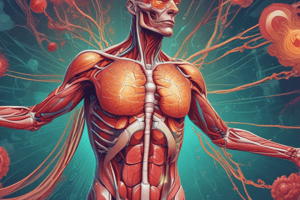Podcast
Questions and Answers
What is the primary function of cytokines in the inflammatory response?
What is the primary function of cytokines in the inflammatory response?
- To release chemical mediators
- To cause changes that protect the body (correct)
- To destroy foreign cells
- To repair damaged tissue
What type of immunity involves recognition and memory?
What type of immunity involves recognition and memory?
- Non-Specific immunity
- Adaptive immunity (correct)
- Physical immunity
- Innate immunity
What is the role of the keratin coating on the skin in the body's defense?
What is the role of the keratin coating on the skin in the body's defense?
- To provide a physical barrier (correct)
- To facilitate phagocytosis
- To produce cytokines
- To release chemical mediators
What is the process by which cells engulf and destroy foreign particles and cells?
What is the process by which cells engulf and destroy foreign particles and cells?
What is the purpose of stomach acid in the body's defense?
What is the purpose of stomach acid in the body's defense?
What is the outcome of the release of chemical mediators by damaged cells?
What is the outcome of the release of chemical mediators by damaged cells?
What is the function of lysozyme in sweat?
What is the function of lysozyme in sweat?
What is the primary function of cilia in the respiratory tract?
What is the primary function of cilia in the respiratory tract?
What is the role of cytokines in the inflammatory response?
What is the role of cytokines in the inflammatory response?
What is the process by which macrophages engulf and digest foreign particles?
What is the process by which macrophages engulf and digest foreign particles?
What is the function of transferrin in the defense against bacterial infection?
What is the function of transferrin in the defense against bacterial infection?
Which type of white blood cell is primarily involved in phagocytosis?
Which type of white blood cell is primarily involved in phagocytosis?
What is the primary function of the epidermis in the skin?
What is the primary function of the epidermis in the skin?
What is the main goal of the inflammatory process?
What is the main goal of the inflammatory process?
What type of defence is responsible for preventing the entry of pathogens into the body?
What type of defence is responsible for preventing the entry of pathogens into the body?
Which of the following is a characteristic of inflammation?
Which of the following is a characteristic of inflammation?
What is the term for the process by which certain cells engulf and digest foreign particles and microorganisms?
What is the term for the process by which certain cells engulf and digest foreign particles and microorganisms?
What are the key mediators of inflammation that play a crucial role in the immune response?
What are the key mediators of inflammation that play a crucial role in the immune response?
What is the name of the layer of the skin where keratinocytes take three to five days to move from the stratum basale to be shed?
What is the name of the layer of the skin where keratinocytes take three to five days to move from the stratum basale to be shed?
What is the term for the flat-topped, elevated, palpable lesion that occurs in psoriasis?
What is the term for the flat-topped, elevated, palpable lesion that occurs in psoriasis?
What is the estimated percentage of psoriasis patients who experience scalp scaling?
What is the estimated percentage of psoriasis patients who experience scalp scaling?
What is the type of psoriasis that is associated with a history of a streptococcal throat infection?
What is the type of psoriasis that is associated with a history of a streptococcal throat infection?
What is the normal duration of the process of keratinocytes moving from the stratum basale to the stratum corneum to be shed?
What is the normal duration of the process of keratinocytes moving from the stratum basale to the stratum corneum to be shed?
What is the characteristic of the nails in psoriasis?
What is the characteristic of the nails in psoriasis?
What is the function of Merkel cells in the skin?
What is the function of Merkel cells in the skin?
What is the term for the transfer of heat between a warmer object and a cooler one without any direct contact?
What is the term for the transfer of heat between a warmer object and a cooler one without any direct contact?
Which type of cell is found in the epidermal layer and produces melanin?
Which type of cell is found in the epidermal layer and produces melanin?
What is the layer of tissue that attaches the skin to underlying bone and muscle?
What is the layer of tissue that attaches the skin to underlying bone and muscle?
What is the process by which a liquid is converted to a vapor, resulting in cooling of the body?
What is the process by which a liquid is converted to a vapor, resulting in cooling of the body?
What is the primary cell found in the epidermal layer of the skin?
What is the primary cell found in the epidermal layer of the skin?
What is the effect of the controlled administration of psoralen and UVA on the skin?
What is the effect of the controlled administration of psoralen and UVA on the skin?
What is the function of emollients in skin treatment?
What is the function of emollients in skin treatment?
What is the effect of coal-tar-based ointments on skin cells?
What is the effect of coal-tar-based ointments on skin cells?
What is the purpose of using vitamin D analogues in skin treatment?
What is the purpose of using vitamin D analogues in skin treatment?
What is the cause of decubitus ulcers?
What is the cause of decubitus ulcers?
What is the effect of retinoids on skin cell development?
What is the effect of retinoids on skin cell development?
Study Notes
Immune System
- Inflammation is a response to tissue damage, which releases chemical mediators (cytokines) that protect the body
- Chemical mediators released by cells include histamine, nitric oxide, serotonin, prostaglandins, heparin, and kinin
Immunity to Pathogens
- Immunity develops with the person and involves recognition and memory
- Innate immunity: the body's natural defenses, including physical barriers, chemical barriers, and inflammation
- Adaptive immunity: provides specific protection against pathogens and involves recognition and memory
Non-Specific Immunity
- Physical barriers: skin, epithelial linings, mucous, cilia, and sweat
- Chemical barriers: stomach acid, lysozyme in sweat, and interferons
- Inflammation: a response to tissue damage, which releases chemical mediators (cytokines) that protect the body
- Phagocytosis: a process in which cells engulf and digest foreign substances
Natural Killer Cells
- A type of lymphocyte that kills a variety of microbes non-specifically
- Bind to receptors on the microbe, release perforins, and induce lysis of the microbe
Phagocytosis
- The process by which cells engulf and digest foreign substances
- Phagocyte binds to the microbe, engulfs it, and captures it into a phagosome
- Lysozyme enzymes kill and digest the microbe, and the products of digestion may be used by the phagocyte
Cytokines
- Most abundant white blood cell (WBC) in circulation, making up 70% of WBCs
- Short-lived, with a lifespan of around 5 days
- Attracted by cytokines released by macrophages and roll on the inside of blood vessels to where they are needed
Antigen
- A substance that the body recognizes as foreign
- Types of defences are categorized: self vs. non-self
Adaptive Immunity
- Different from innate immunity because it defends against specific invading agents and memorizes the antigen for future responses
- Result of an encounter with a foreign substance, divided into humoral response (B lymphocytes) and cell-mediated response (T lymphocytes)
Immune Response
- The body's response to an insult from physical or chemical agents and invasion by microbes
- Objectives: describe the inflammatory process, key mediators of inflammation, and compare and contrast innate and adaptive immunity
Skin Functions
- Protection: physical barrier against external factors, regulation of body temperature, and sensory organ
- Absorption: absorption of Vitamin D
- Excretion: removal of waste products
- Manufacture: production of Vitamin D
Skin Disorders
- Psoriasis: a condition characterized by increased turnover of keratinocytes, resulting in thick, dry, and scaly skin
- Decubitus ulcers: also known as pressure ulcers, caused by shearing forces and prolonged or repeated pressure over skin, soft tissue, muscle, and/or bone
Inflammation
- The reaction of vascularized tissues to cell injury or death, characterized by redness, swelling, heat, pain, and loss of function
- Functions: minimize the effects of injury or infection, remove damaged tissue, dilute, destroy, and neutralize, and promote regeneration and healing
Studying That Suits You
Use AI to generate personalized quizzes and flashcards to suit your learning preferences.
Related Documents
Description
Test your knowledge of the physical and chemical barriers that protect our body against pathogens, including epithelial linings, mucus, cilia, stomach acid, and proteins in the blood. Learn about the different types of antimicrobials and how they work to defend against infection.




